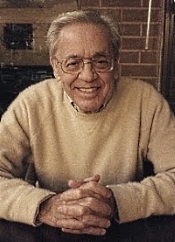 If you're old enough, you may remember a Blake Edwards TV show from the late Fifties called Peter Gunn. The thing is, if you do remember it, I'd be willing to bet you remember the show's theme music better than you do the show itself. Much like the show's main character (a private eye played by Craig Stevens), the music was laid-back and cool.
If you're old enough, you may remember a Blake Edwards TV show from the late Fifties called Peter Gunn. The thing is, if you do remember it, I'd be willing to bet you remember the show's theme music better than you do the show itself. Much like the show's main character (a private eye played by Craig Stevens), the music was laid-back and cool.Henry Mancini (1924-1994), one of Hollywood's most popular and prolific television and movie composers, wrote the music, which went on to win two Grammys and an Emmy award. In fact, Peter Gunn (1958-61) pretty much put Mancini on the map after he had toiled in relative obscurity in the movie industry for half a dozen years previously. From then on, though, it was all a rise to the top with one hit after another: Mr. Lucky, Breakfast at Tiffany's, Days of Wine and Roses, Charade, The Pink Panther series, The Great Race, 10, and hundreds more.
But here's another thing: I'd also be willing to bet that it's only the familiar Peter Gunn theme you remember and not all of the other background music Mancini wrote for the show. It's both the theme and associated music you get on this album: a modern recording of sixteen tracks, over fifty minutes, of music performed by the prestigious Harmonie Ensemble New York lead by conductor Steven Richman.
Of course, the music on the album is not entirely complete. For that you'd have to find the two-disc CD set containing all four of the LP's Mancini released of music from and inspired by Peter Gunn. But it wouldn't sound as good as the present album, and a lot of it might begin seeming a bit repetitious. Anyway, whether you're interested in the Peter Gunn music for purely nostalgic, sentimental reasons or because you like its West Coast Cool style of jazz, Richman's interpretations of the score and Harmonia Mundi's recording of it should fill the order.
While the main theme is every bit as jazzy and cool as we remember it, the other tracks are almost as engrossing. The Harmonie Ensemble use essentially the same orchestrations and instrumentations but have a style all their own. The ensemble's players are all virtuoso jazz or classical players in their own right, and many audiophiles will recognize the pianist, Lincoln Mayorga, for his celebrated Sheffield Lab direct-to-disc recordings. Make no mistake: This group knows what it's about and plays with a precision that most jazz bands only dream about.
 OK, I know that one criticism from some jazz fans is going to be that the Harmonie Ensemble actually play too precisely, too articulately, that with their slick sophistication they lose a little something in the way of spontaneity and improvisation, a staple of most jazz. Yet for these arrangements of TV music, they sound just right, adding inflections and nuances to create atmosphere and moods that practically having us seeing the old show in our mind's eye.
OK, I know that one criticism from some jazz fans is going to be that the Harmonie Ensemble actually play too precisely, too articulately, that with their slick sophistication they lose a little something in the way of spontaneity and improvisation, a staple of most jazz. Yet for these arrangements of TV music, they sound just right, adding inflections and nuances to create atmosphere and moods that practically having us seeing the old show in our mind's eye.Favorites? Yes, I loved "Sorta Blue," with its obviously bluesy tone; "Session at Pete's Pad," with its carefree nonchalance; "Slow and Easy," with its quietly passionate airs; "Brief and Easy," with its Sinatra-like manner; "Blue Steel," with its aggressive rhythms; and an equally forceful closing rendition of the main theme. Fun stuff, all the way around.
To complete the package, Harmonia Mundi provide a light-cardboard slipcover for the CD jewel case. Again, I'm not sure why, but it classes up the joint.
Recording and mastering engineer Adam Abeshouse and producer Robina G. Young made the album in June 2012 at The DiMenna Center for Classical Music, New York City. Sonically, you couldn't ask for more in this genre. The sound is wide-ranging and transparent; the highs shimmer and glisten; the lows have punch; the dynamics are commendable; and the midrange clarity is exemplary. What's more (and somewhat unexpected), there's a nice sense of depth to the ensemble and air around the instruments. The sound engineers handle it all quite realistically.
JJP
To listen to a brief excerpt from this album, click here:







